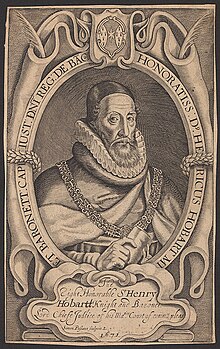Sir Henry Hobart, 1st Baronet
English politician
Sir Henry Hobart, 1st Baronet SL (c. 1560 – 29 December 1625), of Blickling Hall, was an English politician who succeeded Sir Edward Coke to become Chief Justice of the Court of Common Pleas.



Quotes edit
- A woman cannot be a pastor by the law of God. I say more, it is against the law of the realm.
- Colt and another v. Bishop of Coventry and Lichfield (1612), Hob. Rep. 148.
- I may use mine own as I will.
- Robins v. Barnes (1614), Lord Hobart's Rep. 131.
- The laws of the realm do admit nothing against the law of God.
- Colt v. Glover (1614), Lord Hobart's Rep. 149.
- It is the office of Judges to advance laws made for religion, according to their end, though the words be short and imperfect.
- Colt v. Glover (1614), Lord Hobart's Rep. 157.
- We know well that the Primitive Church in her greatest purity were but voluntary congregations of believers, submitting themselves to the Apostles, and after to other Pastors, to whom they did minister of their Temporals, as God did move them. So as Ecclesiasticus, cap. 17, says, God appointed a Ruler over every people, when he divided nations of the whole Earth. And therefore if a people will refuse all government, it were against the law of God; and yet if a popular State will receive a Monarchy it stands well with the Law of God.
- Bruton v. Morris (1614), Lord Hobart's Rep. 149.
- Men will not commonly steal women that are nothing worth.
- Bruton v. Morris (1614), Lord Hobart's Rep. 182.
- I do exceedingly commend the Judges that are curious and almost subtil, Astuti (which is the word used in the Proverbs of Solomon in a good sense, when it is to a good end) to invent reasons and means to make Acts, according to the just intent of the parties, and to avoid wrong and injury which by rigid rules might be wrought out of the Act.
- Earl of Clanrickard's Case (1614), Lord Hobart's Rep. 277.
- Fiction is never admitted where truth may work.
- Wright v. Gerrard (1617), Lord Hobart's Rep. 311.
- The statute is like a tyrant; where he comes he makes all void; but the common law is like a nursing father, makes only void that part where the fault is, and preserves the rest.
- Quoted by Sir Thomas Twisden, 1st Baronet, C.J., in Maleverer v. Redshaw (1670), 1 Mod. Rep. 36 ; and by Wilmot, L.C.J., in Collins v. Blantern (1767), 2 Wils. 351.
Pits v. James (1614), Lord Hobart's Rep. 124-125 edit
- In this case, Lord Hobart rules that a lay minister providing services to the poor under the title of minister did not defraud the public by the use of that title, as he was in fact providing religious services.
- Minister doth not always import an inferior to him to whom he doth minister: for the Psalm saith, God hath made man paulo inferiorem Angelis; and yet in the first chapter to the Hebrews it is said, that the Angels are ministering spirits, sent forth for the good of God's saints.
- God's service in this name is the service of God's house, and therefore they are convertible. And who sees not, that whosoever ministers to the poor, ministers to God ? As it appears in that solemn sentence of the last day, inasmuch as you did feed, clothe, lodge the poor, you did it unto me.
- Who sees not, that whosoever ministers to the poor, ministers to God? as it appears in that solemn sentence of the last day, Inasmuch as you did feed, clothe, lodge the poor, you did it unto me.
- Though all good men be called God's servants in their general vocation, yet they cannot be called the minister of God but to a more special use.
- I commend the Judge that seems fine and ingenious, so it tend to right and equity. And I condemn them, that either out of pleasure to shew a subtil wit will destroy, or out of incuriousness or negligence will not labour to support the act of the party by the art or act of the law.
Sheffield v. Ratcliffe (1615) edit
- That whom he could not by the sword destroy, he might supplant by the law.
- Lord Hobart's Rep. 335.
- Zeal and indignation are fervent passions.
- Lord Hobart's Rep. 335.
- Nothing is more natural than to marry.
- Lord Hobart's Rep. 342.
- Bind not the new statutes so to the common law, that their words increased for the King's advantage, should be deprived of their force.
- Lord Hobart's Rep. 341.
- Aucupia verborum sunt judice indigna: Catching at words is unworthy of a Judge.
- Lord Hobart's Rep. 343.